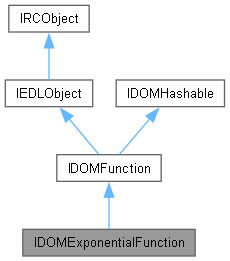Interface for exponential functions. See section 3.9.2 of the PDF 1.7 Reference. Default values are as per described in that reference. There can be only one input for this function type.
More...
#include <idomfunction.h>
|
| virtual float | getOutputC0 (uint32 outputNum) const =0 |
| | Get the output C0 value for a given output to the function.
|
| |
| virtual float | getOutputC1 (uint32 outputNum) const =0 |
| | Get the C1 value for a given output to the function.
|
| |
| virtual float | getExponent () const =0 |
| | Get the exponent (N) value for the function.
|
| |
| virtual eFunctionType | getFunctionType () const =0 |
| | Retrieves function type.
|
| |
| virtual uint32 | getNumInputValues () const =0 |
| | Get the number of input values that this function will operate on.
|
| |
| virtual uint32 | getNumOutputValues () const =0 |
| | Get the number of output values that this function will produce.
|
| |
| virtual void | getInputDomain (uint32 inputNum, float &low, float &high) const =0 |
| | Get the input domain for a given input to the function.
|
| |
| virtual bool | getOutputRange (uint32 outputNum, float &low, float &high) const =0 |
| | Get the output range for a given input to the function.
|
| |
| virtual void | evaluate (const float *inputValues, float *outputValues) const =0 |
| | Evaluate the input through the function and return the result.
|
| |
| virtual void | evaluate (const int32 *inputValues, float *outputValues) const =0 |
| | Evaluate the input through the function and return the result.
|
| |
| virtual const CClassID & | getClassID () const =0 |
| | Returns class ID of IEDLObject.
|
| |
| virtual bool | init (CClassParams *pData) |
| | The init() method is called to perform any post-construction initialization of an IEDLObject that has been created by the EDL class factory, before it is actually returned by the factory.
|
| |
| virtual bool | clone (IEDLObjectPtr &ptrObject, IEDLClassFactory *pFactory) |
| | Create a copy of EDLObject.
|
| |
|
virtual void | addRef () const =0 |
| | Increases the reference count of the actual object pointed to. This would take place during an assignment or copying.
|
| |
| virtual bool | decRef () const =0 |
| | Decreases the reference count of the actual object pointed to. When the reference count falls to Zero, it deletes the actual object pointed to.
|
| |
| virtual int32 | getRefCount () const =0 |
| | Retrieve the current reference count of the actual object pointed to.
|
| |
|
virtual | ~IDOMHashable () |
| | Virtual destructor.
|
| |
| virtual bool | hash (uint64 &hash)=0 |
| | Retrieve a hash for this object.
|
| |
| virtual uint64 | hashE () |
| | As hash(), but throws an exception if the operation fails.
|
| |
|
| enum | eFunctionType |
| | An enum for the various types of functions.
|
| |
|
virtual | ~IRCObject () |
| | Virtual destructor.
|
| |
Interface for exponential functions. See section 3.9.2 of the PDF 1.7 Reference. Default values are as per described in that reference. There can be only one input for this function type.
◆ classID()
| static const CClassID & IDOMExponentialFunction::classID |
( |
| ) |
|
|
inlinestatic |
Retrieves class id of IDOM.
- Returns
- CClassID Class id of the element
◆ getExponent()
| virtual float IDOMExponentialFunction::getExponent |
( |
| ) |
const |
|
pure virtual |
Get the exponent (N) value for the function.
- Returns
- float The exponent
◆ getOutputC0()
| virtual float IDOMExponentialFunction::getOutputC0 |
( |
uint32 | outputNum | ) |
const |
|
pure virtual |
Get the output C0 value for a given output to the function.
- Parameters
-
| outputNum | The 0-indexed output number |
- Returns
- float The C0 value
◆ getOutputC1()
| virtual float IDOMExponentialFunction::getOutputC1 |
( |
uint32 | outputNum | ) |
const |
|
pure virtual |
Get the C1 value for a given output to the function.
- Parameters
-
| outputNum | The 0-indexed input number |
- Returns
- float The C1 value
The documentation for this class was generated from the following file:

 Public Member Functions inherited from IDOMFunction
Public Member Functions inherited from IDOMFunction Public Member Functions inherited from IEDLObject
Public Member Functions inherited from IEDLObject Public Member Functions inherited from IRCObject
Public Member Functions inherited from IRCObject Public Member Functions inherited from IDOMHashable
Public Member Functions inherited from IDOMHashable Public Types inherited from IDOMFunction
Public Types inherited from IDOMFunction Protected Member Functions inherited from IRCObject
Protected Member Functions inherited from IRCObject